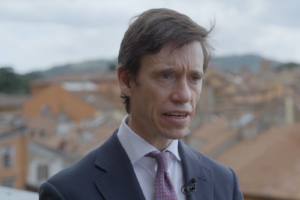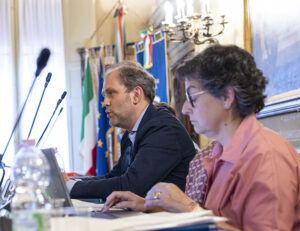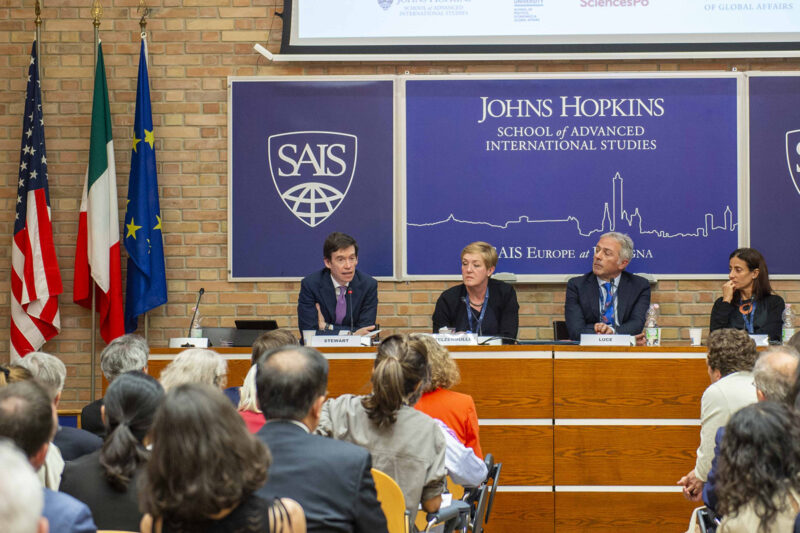The conference, held June 14-16 in Bologna, Italy, focused on Europe-U.S. strategic cooperation in tech, defense and security, and energy.
Prospects for Europe-U.S. cooperation in technology, defense and security, energy, and strategic foresight were at the heart of the debate at the Transatlantic Bridge Conference, an event co-hosted by IE School of Politics, Economics, and Global Affairs (SPEGA), Johns Hopkins School of Advanced International Studies (SAIS), Sciences Po Paris School of International Affairs (PSIA), and Yale University Jackson School of Global Affairs. The three-day conference was held at the Johns Hopkins SAIS Europe campus in Bologna, Italy.
This annual gathering, which began in 2018, is now at its third edition under the theme, “Navigating the Transatlantic Relationship in a Rapidly Changing Global Landscape.” This year, the conference came at a critical juncture, in the wake of the EU parliamentary elections and with the U.S. elections entering a heated period.
“In the complex global scenario,” declared Renaud Dehousse, rector of SAIS Europe, “it is essential to create opportunities for dialogue and in-depth analysis of the future. Bologna is at the center, both physically and metaphorically, of the ‘Transatlantic Bridge’ between the East and the West, and it is on this principle that we at SAIS Europe are pleased to provide the platform for this important conference this year.”
“The transatlantic partnership is fundamental to global peace and prosperity,” added James B. Steinberg, dean of SAIS. “In a dynamic and rapidly evolving world, our shared commitment to cooperation is essential to meeting the major geopolitical challenges and opportunities of our time. Johns Hopkins SAIS is proud to play a part in convening leading thinkers and practitioners to help shape the future of this vital relationship.”

The last decade has witnessed a surge in complex geopolitical tensions that present substantial challenges to the world order. Current tensions stem from a variety of sources, including the continuing effects of the Covid-19 pandemic, Russia’s invasion of Ukraine, the Gaza conflict, and the deepening strategic competition between the United States and China. Against a backdrop of escalating conflicts, existing structures of global governance have come under increasing stress, both because of their inherent limitations in the face of new challenges, and in part due to purposeful subversion by malign actors.
2024 is set to become a pivotal year for Europe, the United States, and the world and elections on both sides of the Atlantic have contributed to the underlying uncertainty. The trans-Atlantic relationship is in flux. America, eyeing an increasingly militant China, a turbulent Middle East, and a bitter, revanchist Russia, is unsure of its priorities. Europe, facing mounting security challenges, economic woes, and the rise of populism, ponders strategic autonomy, even as it fears American abandonment. Climate change looms heavily in the background.
The picture is not all bleak, however. Finland and Sweden have acceded to NATO, which looks more formidable than ever. Europeans are beginning to spend more on their defense. Ukraine, though battered, continues to resist the Kremlin’s aggression. Technological breakthroughs, including in artificial intelligence, present hitherto unthinkable opportunities for bettering the world, even as they pose unique ethical and regulatory dilemmas. Questions remain on what the objectives of this rebooted relationship should be in a world where the rules-based international order is challenged by China and Russia, and Europe is still attempting to define its role on the global stage.

“What unites us across the Atlantic goes beyond economics and security: European and American citizens have shared the same values on democracy and self-government, and aspirations towards peace and individual freedom for close to two and a half centuries now. The last few years, these values have been under attack, by tanks and artillery as much as through disinformation. Our adversaries have made our shared destiny, long aspirational, a necessity for survival. This conference brings together today’s thinkers, analysts and policy makers from both sides of the Atlantic, with the goal to foster a common understanding of the threats we face and build the relationships necessary to shape a united response. As a professional school focused on educating future leading policymakers, the Yale Jackson School of Global Affairs is proud to nurture and strengthen these important dialogues,” said Jim Levinsohn, dean of the Yale Jackson School of Global Affairs.
Arancha Gonzalez, dean of the Paris School of International Affairs at Sciences Po added: “Strong academic bridges are an essential component of the transatlantic relationship. By deploying our intellectual and convening capacity we can contribute to advancing solutions to our common challenges. As Europeans and Americans go to the polls, in a world where instability and conflicts are spreading, Sciences Po is proud to work with its partners to help build resilience.”
Manuel Muñiz, dean of IE School of Politics, Economics, and Global Affairs, highlighted: “this year is pivotal for transatlantic relations. With elections in Europe and the US, the nature and substance of the transatlantic partnership will be shaped for years to come. Discussing how Europe and the US should address the challenge of the Ukraine war, or that in Gaza, or how to manage the rise of China is paramount. Additionally, the economic partnership across the Atlantic, which is the world’s most important economic relationship, is also under strain. Bringing together experts and practitioners to discuss these matters, as we did in March with the Transatlantic Bridge Strategic Foresight Workshop in Madrid, is extremely important and we are very happy to be doing this with our excellent partners from Yale, SAIS and Sciences Po.”
The purpose of this annual conference of the Trans-Atlantic Bridge is to consider these and other developments in their regional and global contexts, and explore their salience for the future of Europe, the West, and the broader world. Participants, including government officials, journalists, distinguished faculty, and corporate executives from across the globe, will engage in these critical discussions.
- Watch a recording of the opening panel discussion, “Trouble Across the Pond: Democratic Crises and the Future of the West,” featuring Rory Stewart.
- Watch the recap video from the three-day conference
